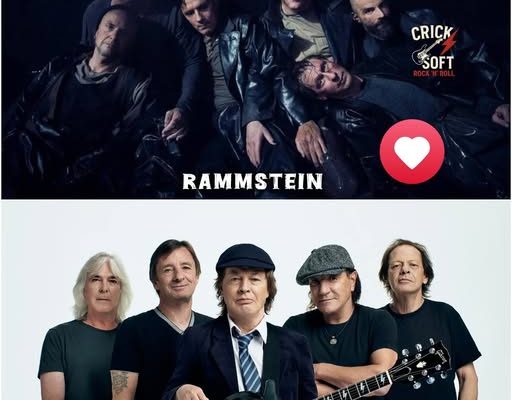Rammstein vs. AC/DC: Why the German Titans Edge Out the Aussie Legends
When two monumental forces in rock history are compared, the discussion inevitably becomes one of taste, legacy, culture, and impact. AC/DC, the Australian hard rock powerhouse, has carved itself into the DNA of rock and roll for decades. Their riffs are iconic, their choruses recognizable in stadiums and bars alike, and their energy is unrelenting. On the other hand, Rammstein, the German industrial metal giants, emerged out of the chaos of the 1990s with a sound, aesthetic, and live show so explosive that they transcended language barriers and reshaped what heavy music could mean on the world stage. Both bands represent very different musical traditions and cultural exports, but when it comes to measuring endurance, innovation, performance, and influence in today’s era, the German titans Rammstein have managed to edge out the Aussie legends AC/DC in a way that is both surprising and inevitable.
AC/DC is, without question, a cornerstone of hard rock history. From the immortal riffs of “Back in Black” to the rebellious anthem “Highway to Hell,” their music distilled the essence of blues-driven rock and roll into pure adrenaline. They were loud, they were simple, and they were universal. For decades, they dominated stages worldwide, their sound blasting from radios, jukeboxes, and arenas alike. Their formula was famously straightforward: a hard-hitting guitar riff, straightforward drumming, a thumping bass, and the distinctive wail of Bon Scott and later Brian Johnson. It was raw, accessible, and timeless. Yet, the very simplicity that made them so appealing has also been their limitation. Their sound rarely evolved, their formula remained nearly untouched, and their shows—while powerful—never crossed into the theatrical dimensions that later bands, particularly Rammstein, would embrace and revolutionize.
Rammstein came from an entirely different world. Born in post-Cold War Germany in the mid-1990s, they combined crushing industrial riffs with electronic elements, militaristic rhythms, and deep, guttural vocals delivered in their native German tongue. Where AC/DC’s music celebrated rebellion, drinking, and rock and roll excess, Rammstein’s music ventured into darker, more provocative, and often taboo territories—songs about love, pain, desire, violence, and politics—always wrapped in layers of irony, satire, and performance art. For many non-German speakers, the lyrics were indecipherable, yet the raw power of their delivery transcended the language barrier. The growl of Till Lindemann, paired with the mechanized guitar assault of Richard Z. Kruspe and Paul Landers, and the pounding rhythmic backbone of Christoph Schneider, Oliver Riedel, and Christian “Flake” Lorenz, created something more than music—it was an experience, a phenomenon that listeners could feel viscerally regardless of their native tongue.
One of the most critical factors that makes Rammstein edge out AC/DC is their live performance. While AC/DC has long been known for their energetic shows, with Angus Young duck-walking across the stage in his schoolboy outfit and Brian Johnson belting out vocals with trademark rasp, their performances remained rooted in rock and roll tradition: amplifiers, lights, some pyrotechnics, and pure energy. Rammstein took the idea of a live show and redefined it into something closer to an operatic spectacle of fire, machinery, and theater. Their concerts are infamous for their pyrotechnics—flamethrowers, fire cannons, burning pianos, exploding props, and Lindemann himself often engulfed in flames as he sang. Each show is a carefully choreographed production, blending music with visual storytelling, blurring the line between rock concert and performance art. For fans, a Rammstein concert is not merely about hearing their favorite songs—it is about witnessing an overwhelming sensory experience that cannot be replicated by any other band. In a world where live music must compete with endless digital entertainment, Rammstein has crafted shows that are essential to witness firsthand, ensuring their enduring relevance.
Cultural influence is another area where the German giants have surprisingly surpassed their Australian predecessors. AC/DC’s influence is undeniable; countless rock bands cite them as foundational, and their music has become an anthem for sports arenas, commercials, and films. Yet, that influence largely remains within the boundaries of hard rock and its traditional audiences. Rammstein, by contrast, has extended its reach into places few German-language acts ever dared to tread. They have made the German language itself cool in a global music scene dominated by English. They have inspired countless bands across genres—industrial, metal, electronic, and even pop artists who admire their stagecraft and theatrical boldness. Their controversial themes and imagery, often misinterpreted as shock for shock’s sake, have sparked academic discussions about satire, art, and censorship. Where AC/DC provided the soundtrack to parties and stadiums, Rammstein provided material for cultural and intellectual discourse while still commanding stadium-sized audiences.
Another factor in this comparison lies in musical evolution. AC/DC perfected their formula early on, but they never deviated from it. For some fans, this is a badge of honor, proof of authenticity, a refusal to “sell out” or follow trends. For others, it has meant stagnation, an unwillingness to grow creatively. Rammstein, on the other hand, while often maintaining their signature industrial sound, have consistently experimented within their own framework. They infused electronic dance music into their heavy riffs, introduced orchestral arrangements, dabbled in softer ballads alongside their crushing anthems, and constantly toyed with the boundary between heavy aggression and melodic subtlety. Albums like Mutter, Sehnsucht, and Liebe ist für alle da showcase this diversity while retaining a cohesive identity. Their self-titled 2019 album demonstrated maturity, combining their traditional ferocity with hauntingly beautiful compositions. Rammstein’s willingness to evolve without losing their essence has allowed them to stay fresh and relevant in ways that AC/DC, however legendary, struggled to achieve.
Longevity is also a striking point of comparison. AC/DC, formed in 1973, enjoyed decades of dominance, but their trajectory has been marred by personal and health challenges. The deaths of Bon Scott and Malcolm Young, the hearing issues of Brian Johnson, and other setbacks slowed their momentum. While they remain beloved, their output has slowed, and their newer material often struggles to recapture the lightning-in-a-bottle energy of their earlier years. Rammstein, despite controversies, internal tensions, and long gaps between albums, have consistently returned with material that reignites excitement and pushes boundaries. They have maintained their relevance not just through nostalgia, but through continued innovation and cultural presence. Their global tours sell out instantly, their videos generate millions of views, and their new releases are treated as major events.
Global reach further cements why Rammstein edges out AC/DC in the modern era. AC/DC has always had global appeal, particularly in the Anglosphere, but their cultural dominance is strongest in English-speaking nations. Rammstein, however, emerged from a non-English-speaking country and still conquered markets across North America, South America, Asia, and beyond. They proved that language is not a barrier to global stardom if the music, performance, and emotion are strong enough. Their fans chant German lyrics in countries where few speak the language fluently, their albums top charts worldwide, and their influence continues to spread among younger generations who crave something bold and uncompromising.
Thematically, Rammstein also dares to go where AC/DC never ventured. AC/DC’s songs are iconic, but they largely revolve around classic rock tropes: sex, partying, rebellion, and raw power. They are fun, infectious, and immortal in their simplicity. Rammstein, on the other hand, confronts uncomfortable truths and taboo subjects—political corruption, war, love’s darker sides, abuse, and existential despair—often cloaked in metaphor, irony, or satire. They challenge their audiences not only to feel, but to think, to question, and to confront the shadows of human experience. This daring approach gives their art a depth and resonance that reaches beyond entertainment into the realm of provocation and reflection.
Of course, comparisons between such titans can never be black and white. AC/DC deserves their legendary status, and their contribution to the canon of rock music is immeasurable. They embody rock and roll in its purest, most unfiltered form, and their influence will echo for generations. But when weighing the impact of both bands in today’s cultural, artistic, and live performance landscape, Rammstein stands taller. They have not only matched AC/DC’s power but expanded the definition of what a rock band can achieve. They bridged language barriers, reinvented live performance, sparked cultural debates, and continued evolving musically while maintaining global dominance. They represent not just a band, but an artistic movement that continues to expand its reach and challenge conventions.
In the end, the comparison is not about diminishing AC/DC’s legacy but recognizing that music is a living, evolving force. AC/DC built the foundation of hard rock, but Rammstein built a cathedral of fire, steel, and provocation upon it. The German titans edged out the Aussie legends not by copying their formula, but by daring to create something entirely their own—something larger than life, impossible to imitate, and unforgettable to witness. For the fans who continue to pack stadiums around the world, chanting in German, engulfed in flames, and swept up in the spectacle, the conclusion is clear: in the modern battle of giants, Rammstein has taken the crown.



